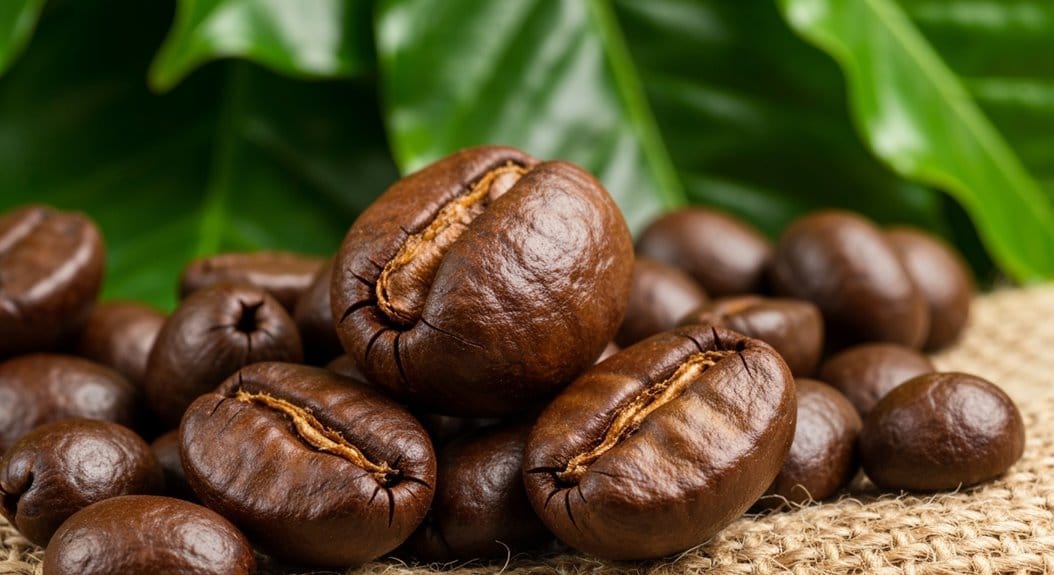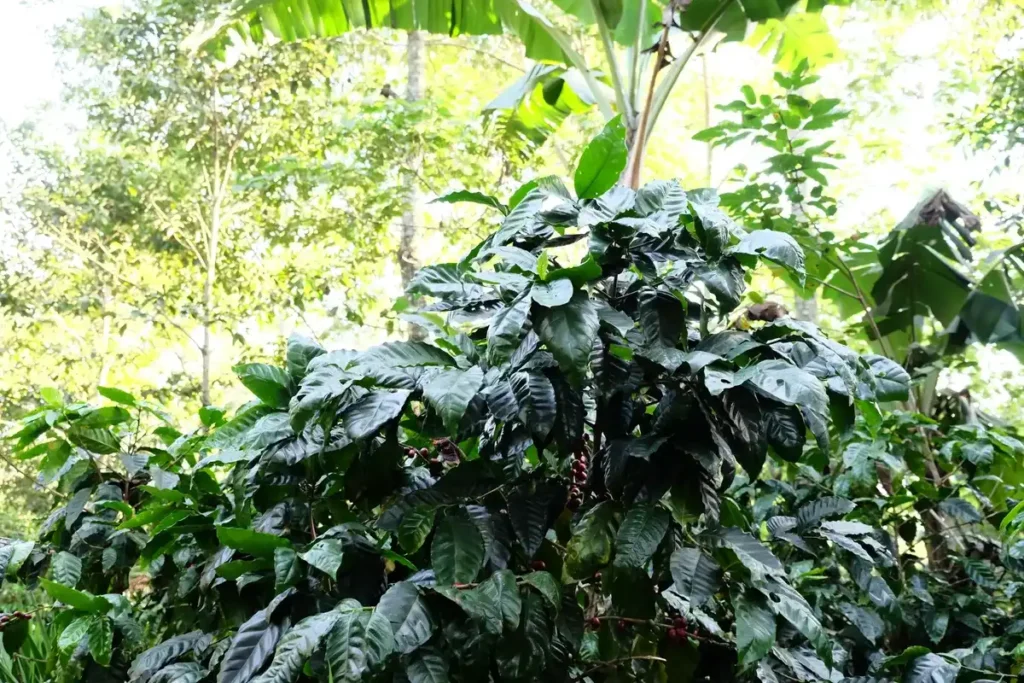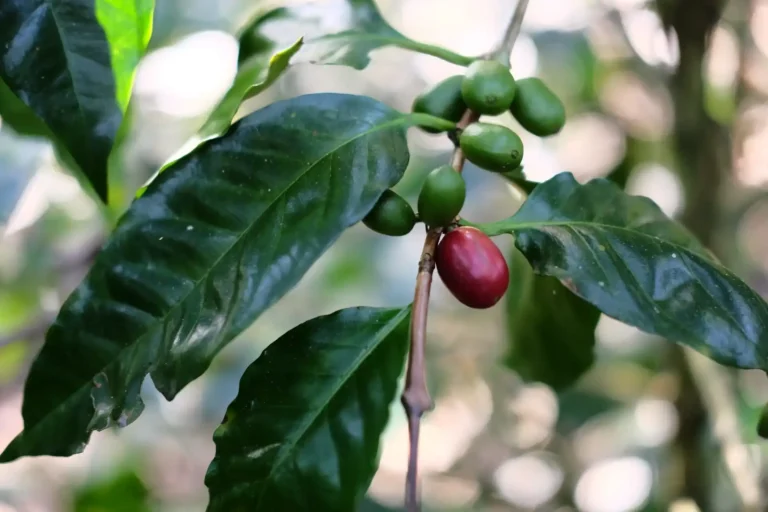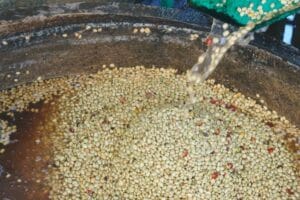Maragogipe coffee is like the bigfoot of the coffee world—it’s rare, mysterious, and has these giant beans, which earned it the nickname “elephant coffee.” Uncovered in Brazil, this Arabica variety is celebrated for its sweet, fruity flavor and creamy mouthfeel. But here’s the kicker: it has a lower yield, which means it’s pricier and farmers have to deal with pesky pests! So, if you’re curious about its unique taste and cultivation challenges, stick around for more!
Key Takeaways
- Maragogipe coffee, discovered in 1870 in Brazil, is a unique genetic mutation of the Typica Arabica variety.
- Also known as “elephant coffee,” Maragogipe beans are notably large and have a unique porous structure.
- This coffee features complex flavors, including notes of blackcurrant, peach, and floral hints, resulting in a sweet, creamy mouthfeel.
- Cultivation poses challenges such as lower yields, higher vulnerability to pests, and intensive management requirements.
- Limited supply enhances market demand, making Maragogipe a desirable choice among specialty coffee enthusiasts.
Origin and Classification of Maragogipe Coffee
Ah, Maragogipe coffee, the diva of the coffee world! Uncovered in 1870 in Bahia, Brazil, it’s like the celebrity of coffee—an accidental superstar, thanks to a genetic mutation of the Typica arabica variety. Imagine a tall, striking bean, flaunting its plant morphology like a runway model, only to be compared to its celebrity relatives! Some say it may have a dash of Bourbon but, hey, who knows? It strutted its way from Brazil to Central America, becoming the darling of specialty farms in Mexico and Guatemala! This peculiar variety is believed to be a hybrid between Typica and Bourbon, though the exact lineage remains uncertain. But with fame comes challenges; its low yield and vulnerability to pests are like pesky paparazzi in a diva’s life—truly frustrating! Still, this coffee’s charm keeps it in high demand—go figure!
Characteristics of Maragogipe Beans
Maragogipe beans are something special!
These beans are like the gentle giants of the coffee world, often referred to as “elephant coffee beans” because, wow, they’re huge! Their bean morphology is pretty unique; they’re kind of porous, which can really change how flavors pop during extraction.
Maragogipe beans are the gentle giants of coffee, known for their huge size and unique porous structure that enhances flavor extraction.
And let’s not forget their massive coffee cherries and leaves! So, they’re not just big but also a bit shy on the yield—about 25% less than other Arabica varieties.
Catching them in their prime involves knowing your soil and altitude, like picking the perfect avocado (talk about pressure!).
A sensory analysis shows they’re a rare treat—if only they rose to fame like celebrities! Who knew beans could be so dramatic?
Flavor Profile of Maragogipe Coffee

With regard to flavor, Maragogipe coffee doesn’t just strut its stuff—it rolls out the red carpet! Imagine sipping on a cup that’s like a fruit fiesta in your mouth, bursting with complex notes of blackcurrant and peach.
It’s sweet, but never too sweet, with a floral hint of orange blossom and wildflower honey—yes, please! And let’s talk about the mouthfeel characteristics: it’s creamy and plush, giving you that cozy blanket vibe while you sip.
You’d think a coffee this good would have some secret—or maybe just a really well-kept farm, right? With spicy undertones sneaking in now and then, each brew can surprise the taste buds.
Seriously, this coffee puts a fun spin on your morning routine!
Cultivation Challenges Faced by Producers
Crafting a successful crop of Maragogipe coffee is like steering a rollercoaster—every twist and turn presents unexpected challenges! Initially, those notoriously large beans may look impressive but come with a catch: lower yields! Oh, great!
Next, those pesky pests—like coffee leaf rust—know how to crash the party, demanding intense pest management.
Pesky pests like coffee leaf rust are party crashers, bringing a headache of pest management with them!
And finally, processing? Forget about it! It’s like trying to fit a square peg in a round hole, making those oversized beans a real headache during sorting.
- Low productivity means farmers must charge way more per pound!
- Fewer plants per hectare? Less coffee—where’s the sense in that?
- Constant disease threats? Yikes! Who signed up for this?
Maragogipe’s got character, but it sure tests patience!
Market Demand for Maragogipe Coffee

As far as coffee is concerned, not all beans are created equal, and boy, does Maragogipe stand out like a neon sign at a midnight carnival! This specialty coffee has stolen the hearts of adventurous drinkers, and honestly, who can blame them?
With its smooth taste hiding chocolatey, nutty, and fruity notes, it’s like a flavor rollercoaster! Market trends show an increasing demand for unique coffees, but there’s a catch—limited supply!
Producers are facing all sorts of crazy challenges, from pests to pricey production costs, which makes effective pricing strategies essential.
But hey, that scarcity makes Maragogipe as fancy as a tuxedo at a coffee shop! So, keep your eyes peeled; this coffee is what the cool kids are sipping!
Frequently Asked Questions
How Does Maragogipe Coffee Compare to Other Coffee Varieties?
Maragogipe coffee stands out for its large bean size and complex taste profile, characterized by low acidity and floral notes. In comparison, other varieties often offer higher yields but lack Maragogipe’s unique, refined flavor complexity.
Can Maragogipe Coffee Be Grown Outside Brazil?
Yes, Maragogype coffee can be successfully grown outside Brazil, provided that climate requirements and growth conditions such as volcanic soil, elevation, and adequate shade are met, as demonstrated in regions like El Salvador and Hawaii.
What Brewing Methods Are Best for Maragogipe Coffee?
Ideal brewing methods for Maragogype coffee include espresso, French press, and pour-over. Each technique emphasizes its unique flavor profile, showcasing floral and chocolatey notes while requiring specific grind sizes and extraction times for best results.
Is Maragogipe Coffee Certified Organic or Fair Trade?
Maragogype coffee often holds both organic and Fair Trade certifications, ensuring it meets certification standards that emphasize sustainability practices. These certifications promote ethical farming and improve producer livelihoods while appealing to environmentally conscious consumers.
How Can I Identify True Maragogipe Beans?
To identify true Maragogipe beans, one should look for Maragogipe characteristics like large size, porous texture, and distinct flavor profiles. Authentic beans will exhibit consistent morphology and notable sensory qualities upon careful inspection and tasting.





